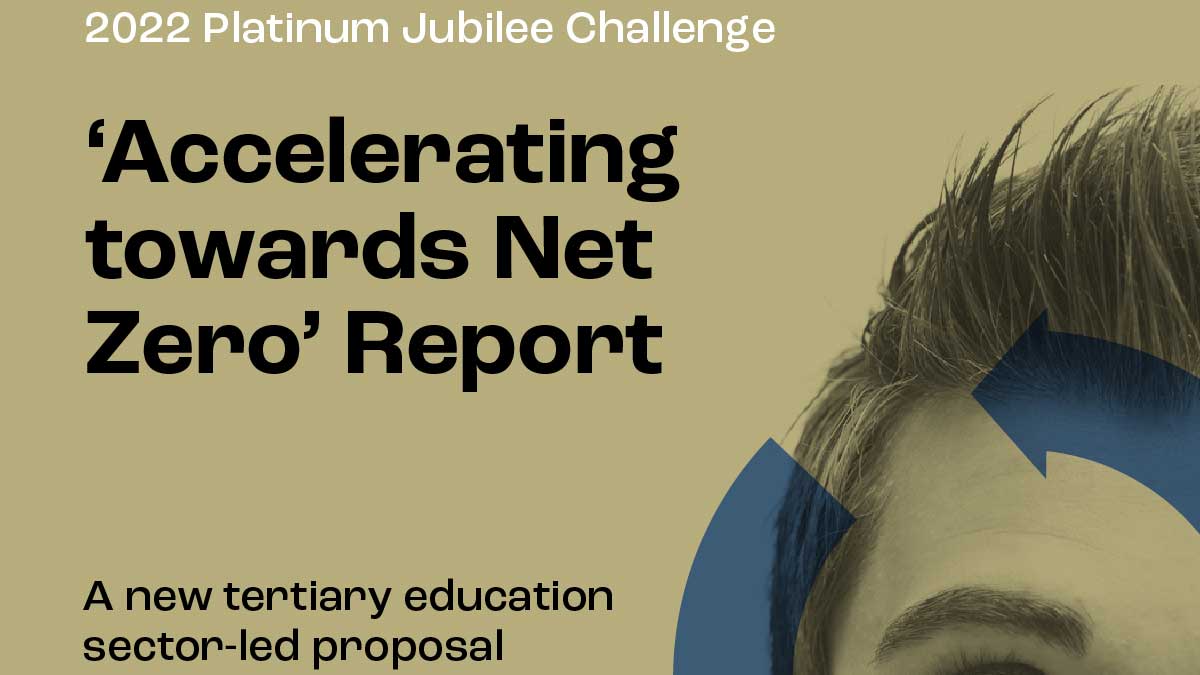Published:

First profile of carbon footprint for UK Higher and Further Education Institutions released alongside innovative framework for sector-wide carbon reporting
The Royal Anniversary Trust today released “Accelerating towards Net Zero,” an ambitious roadmap for carbon reduction in the tertiary education sector. The report offers a robust profile of the tertiary education sector's carbon footprint – the first of its kind – using detailed modelling which highlights target areas for emissions reporting and reduction. It also proposes a new standardised carbon reporting framework designed exclusively for the sector which will enable all HE and FE institutions to measure, report and manage carbon emissions.
The report is the result of a year-long research project – The Platinum Jubilee Challenge – led by 21 higher and further education institutes from across the UK, all recent winners of the prestigious Queen's Anniversary Prize including Heriot-Watt University. It concludes with 14 clear recommendations to Government and priorities for the sector that will accelerate progress towards Net Zero; Ministers have committed to responding by 28 March, 2023.
Kristina Murrin, CEO of The Royal Anniversary Trust commented: “Our ambition was to bring together the extraordinary winners of the Queen's Anniversary Prizes to collectively tackle a tough shared challenge. The resulting report sets out a clear action plan for the tertiary education sector to accelerate progress to Net Zero, with recommendations for institutions and government. We are enormously proud of the proposed carbon reporting Framework – if adopted sector-wide, this will allow for consistent, transparent, and data-led decision making.”
Collaboration and partnership have been crucial in the formation of this report which contains ambition to match the scale of the climate change challenge
Professor Mercedes Maroto-Valer, Deputy Principal for Global Sustainability at Heriot-Watt University, said: “Collaboration and partnership have been crucial in the formation of this report which contains ambition to match the scale of the climate change challenge. We are delighted that our students and staff have been part of the Platinum Jubilee Challenge and we will continue working on the recommendations and goals of the report as we move further into the implementation of our own Global Sustainability Strategy.”
Report highlights:
The Department for Education has confirmed that they are asking universities and colleges to report their carbon emissions by 2024 as per their Sustainability & Climate Change Strategy. While many do already report, there is currently no agreed model or framework to allow them to do this consistently. The Challenge group sought to rectify this. Accelerating towards Net Zero provides a comprehensive overview of specific challenges and opportunities for decarbonisation of the tertiary education sector and how this can drive change across wider society.
- The report provides the first estimated total carbon footprint for the tertiary education sector. Emissions across Scope 1, 2 & 3 were estimated to be 18.1 Mt CO2e, with HE institutions contributing approximately 86% of this and FE 12%.*
- The report includes a sector-specific Standardised Emissions Reporting Framework based on the Greenhouse Gas Protocol.
- The report identifies three key Action Pathways to Net Zero: The Built Environment, Travel and Transport, and Sustainable Supply Chain. Together these three areas account for 80% of the sector's total emissions.
- 19% of the sector's total emissions are related to the Built Environment, representing an institution's Scope 1 and 2 fuel and electricity as well as Scope 3 emissions related to construction.
- 24% of the sector's total emissions relate to Scope 3 Travel and Transport from business travel, employee and student commuting and international student travel.
- 36% of the sector's total emissions relate to Scope 3 Supply Chain emissions, which are highly influenced by specialised purchases such as medical equipment and business services. - The report outlines practical measures the government can take through policy, regulation and resources that will unlock system-wide change to facilitate decarbonisation.
- The report includes five student-led funded projects and over 30 innovative case studies including the largest Passivhaus Premium building in the world; an online staff and student sustainability engagement platform; creative partnerships with local public transport links; green Cloud computing service and climate solutions training.
You can read or download the report from the Royal Anniversary Trust's website on this link.
The full Standardised Carbon Emissions Reporting Framework (SCEF) is available on the EAUC website on this link.
*The detailed work on the carbon footprint modelling for the report was conducted by SB+CO and EcoAct. Data was used for the academic year 2020/21, except Business Travel that is based on 2018/2019 data to reflect pre-pandemic activity. Financed emissions are excluded.